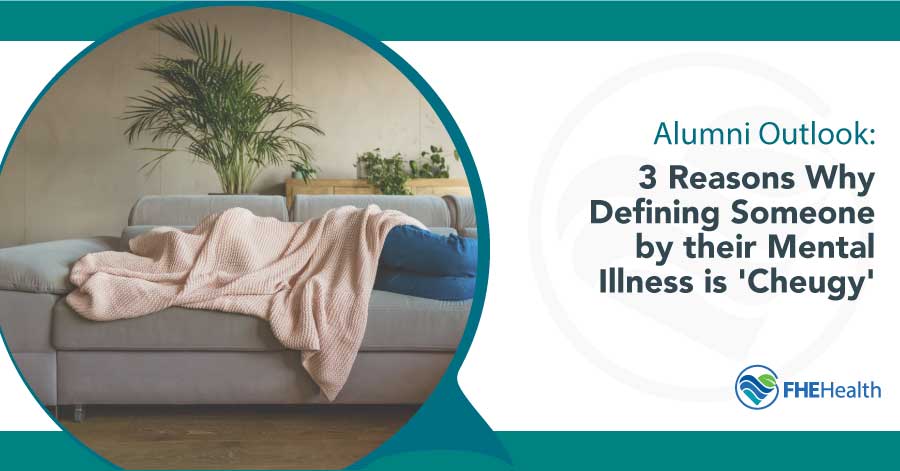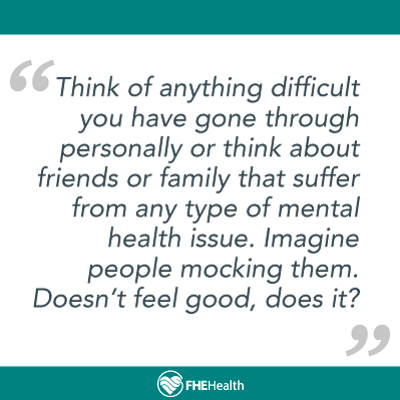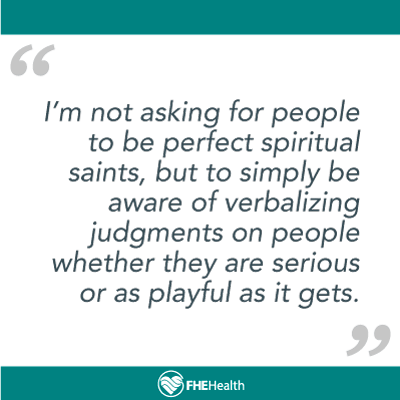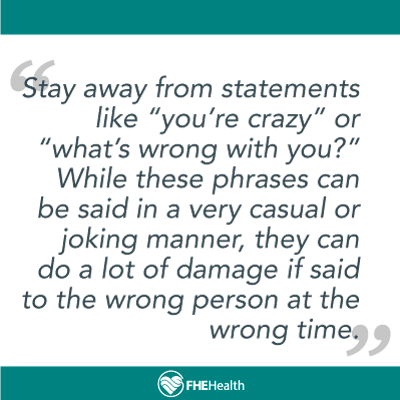
“Cheugy” is a term that was created by someone on TikTok who had invented it herself and shared it with her friends before bringing it to the masses on social media. It caught fire quickly and suddenly we had a new word invented.
Following trends or saying things that are now stale and out of style is “cheugy.” If it used to be a big trend, but no longer is, that’s cheugy.
Your video of the fireworks on the 4th of July? Cheugy. The inspirational sign you bought from Hobby Lobby and made sure to share on Facebook? Cheugy.
Calling someone “crazy” because they have bipolar, or schizophrenia is a 10 out of 10 on the cheugy scale if you ask me. Let’s look at some reasons why.
Mental Health Does Not Discriminate
 For a lot of the stereotypes and assumptions we have about certain demographics, we can look to Hollywood for perpetuating that assumption through TV and film.
For a lot of the stereotypes and assumptions we have about certain demographics, we can look to Hollywood for perpetuating that assumption through TV and film.
For a long time, mental health issues in TV and film were represented by things like someone staying locked up in a room and crying for days or somebody rambling on a street corner and talking to invisible people.
Naturally, people just began to think “crazy” was a normal thing to label people; that if you were suffering from a genuine diagnosis of a mental health problem, you were on the brink of snapping.
Thankfully, in the past few years, top celebrities and athletes have opened up about their struggles with depression and other issues. This is a huge deal because the “face” of those suffering from mental health problems is evolving. When somebody who is already well-established and successful admits they have been clinically depressed their whole life, that can change a lot of people’s “cheugy” opinions quickly.
Simone Biles dropping out of the Olympics because of her mental health is one of the best sports stories in a long time. The most important factor was that she stayed with her team and talked publicly about it, and she got international support because of it.
Had Biles done that in the 90’s, we all know that story wouldn’t be as “feel good.” There would have been more criticism due to a lack of education.
Words Are Powerful
 “Sticks and stones may break my bones but words will never hurt me.”
“Sticks and stones may break my bones but words will never hurt me.”
Thankfully, in 2021, we have come to pretty good terms that this is not the best advice to give children as they grow up. Words can hurt, they can hurt tremendously.
For those struggling with their mental health and trying their best to stay strong, a simple judgment or negative comment can shatter them. So how do you know someone is struggling with their mental health all the time? You don’t know. It isn’t obvious a lot of the time.
I can recall times in my life when I felt awful and hopeless inside, but I was quite good at putting on the mask and acting to make it look like everything was okay. The most simple, harmless joke or ribbing was enough to send me into a tailspin.
Look, I am a realist and understand that at certain times I misinterpreted some things said around me and made it about me because I was a very self-centered drug addict. I’m not asking for people to be perfect spiritual saints, but to simply be aware of verbalizing judgments on people whether they are serious or as playful as it gets.
Stay away from statements like “You’re crazy” or “What’s wrong with you?” While these phrases can be said in a very casual or joking manner, they can do a lot of damage if said to the wrong person at the wrong time.
NAMI (National Alliance on Mental Illness) has amazing information on its website, such as these tips on how to help a person with mental illness.
Awareness Is In
 Education in understanding the diversity of our country is very much “in” these days. Every day, people in power and those who have any amount of fame are being held accountable for problematic beliefs or words they may say.
Education in understanding the diversity of our country is very much “in” these days. Every day, people in power and those who have any amount of fame are being held accountable for problematic beliefs or words they may say.
You do not want to be part of the “everyone is too sensitive these days” crew. It is arrogant and narrow-minded. Open yourself up to be teachable. Think of anything difficult you have gone through personally or think about friends or family who suffer from any type of mental health issue. Imagine people mocking them. Doesn’t feel good, does it?
I had my time when I thought the world was too sensitive. Thankfully I had some friends who were willing to challenge my beliefs. I was a year or so sober and had done some work, so being teachable and being able to admit I was wrong was a possibility.
I got honest with myself and realized I could not at all pretend to know what it feels like to have a clinical mental illness, be a minority, or have a different sexuality. These are all groups that are highly discriminated against, which is something I have never personally experienced as a white male.
I had to do research and learn how to be more of an ally to these groups. There are great resources out there on how to improve in that area. It takes time and effort to flip the script and change views, but it can happen.
In the past 5 years, I have slowly continued to learn how I can be an ally to any discriminated group. It is an amazing feeling to be a part of the agenda that calls for equality for all people regardless of background. It has saved me a lot of delusional anger and stubbornness and truly has made me a greater human being.
Ask yourself if you have any brash judgments towards those suffering from mental health issues. Reflect on misconceptions you have had in the past and belief systems that should be reconsidered. People in your life with mental illness that notice you becoming more of an advocate will genuinely appreciate it, in a way you may never understand.
Don’t you want to do everything you can to be at a minimum level of “cheugy?” Start with this step. It’s a big one.






